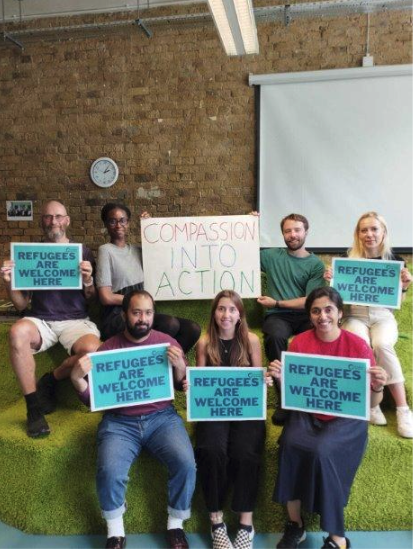 By Denis Fernando Friends of the Earth Campaigner
By Denis Fernando Friends of the Earth Campaigner
Across the globe, people are increasingly feeling the impacts of climate change like extreme storms and devastating droughts. When faced with these disasters, people are often forced to move. Historically, migration has been a common adaptation strategy for dealing with a changing climate, however migration is increasingly being intentionally toxified.
Historically it’s wealthier countries in the Global North that are responsible for climate breakdown, fuelling addiction to fossil fuels through colonialism and the exploitation of resources. However, those who’ve done the least to cause the crisis are the most impacted. Poorer countries in the Global South are hit hardest despite having the least resources to cope and recover. People of colour, women and children are also disproportionately vulnerable. UN Secretary-General Antonio Gutteres, called out the fossil fuel industry in the climate crisis last week. “The godfathers of climate chaos – the fossil-fuel industry – rake in record profits and feast off trillions in taxpayer-funded subsidies,” he said. “It is a disgrace that the most vulnerable are being left stranded, struggling desperately to deal with a climate crisis they did nothing to create. We cannot accept a future where the rich are protected in air-conditioned bubbles, while the rest of humanity is lashed by lethal weather in unlivable lands.”
Government failures
The response of Western governments doesn’t address the current situation or their historic responsibilities. Unfortunately, many Governments have instead engaged in divisive narratives. The UK’s “stop the boats” and Trump’s “build a wall” narratives in recent years ignore the underlying causes of economic instability, war, persecution and extreme climate events. Instead, they contribute to a hostile environment which energises an increasingly violent far-right movement. Similarly, rather than taking urgent climate action, we’ve seen governments portray increased border enforcement and military involvement as solutions to the climate crisis.
Changing the narrative
When speaking about climate breakdown, we have a responsibility to ensure that we don’t allow the movement of  people due to climate impacts and environmental damage to be framed through narratives of fear and burden. Too often, governments and the
people due to climate impacts and environmental damage to be framed through narratives of fear and burden. Too often, governments and the
media only associate displacement with conflict and violence, or use dehumanising language. Consequently, refugees and migrants can be seen as a security risk or a threat.
This also distracts attention from the need for safe routes for those seeking refuge, and from the responsibility of governments to support their fair share of refugees and displaced people, many of whom don’t travel beyond their borders or those of their neighbouring countries. People move for a number of complicated and nuanced reasons of which climate impacts may be one.
Migration matters
Migration is one of the oldest ways of adapting to climate and environmental changes. Migrants play an invaluable role in our public services, essential for an ageing population like the one we have.
People need to have the right to move, and to move safely. It’s deeply concerning that many in power are seeking to remove the rights of refugees and migrants. We need governments to protect and strengthen these rights, not take them away.
And in neutralising the fear, hatred, division and racism that stigmatises the worst of this debate, it enables us to look at who benefits from such diversion and scapegoating; the fossil fuel industry who are responsible for climate wrecking emissions and price hikes on our bills. We should see the toxic debate as part of the ‘business as usual’ status quo in which all of us, whether we are asylum seekers, refugees, migrants, or not, lose out.
Friends of the Earth acts in solidarity with refugees and defends human rights in the UK and around the world. Find out more about the link between climate, migration and refugees.
Friends of the Earth staff supporting Refugee Week 2023